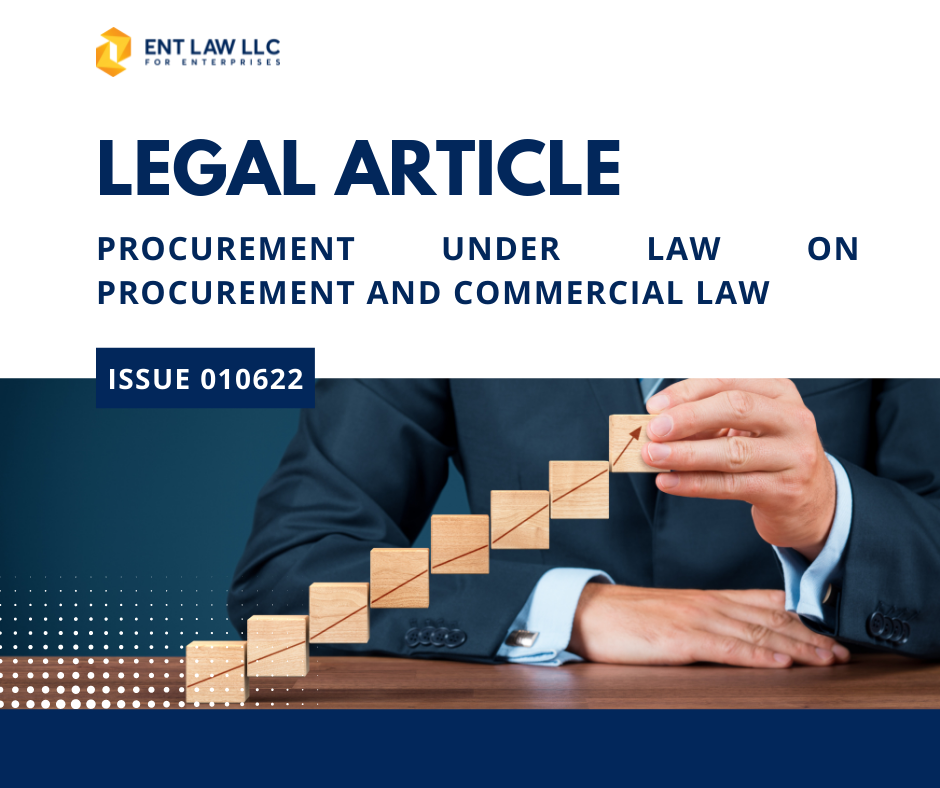Dear Valued Clients,
Procurement is a special transaction method whereby an investor (or service user) sets certain requirements to select suppliers of goods or services who meet with those requirements, then the two parties can conduct the transaction according to terms and conditions they have established. Thus, from a general perspective, procurement is a method of selection to establish a working relationship based on the requirements of one party, with the satisfaction of those requirements of the other party.
Vietnam’s legal provisions distinguish the cases of procurement for selection of contractors providing services, sale of goods, and selection of investors under the Law on Procurement from procurement of goods and services under the Commercial Law. To highlight the differences of procurement activities under those two laws, we would like to summarize some criteria below for your kind reference.
The procurement under the Law on Procurement
Procurement is the process of selecting contractors to sign and perform contracts for the provision of consulting services, non-advisory services, sale of goods, construction and installation; select investors to sign and perform contracts on investment projects using the land in order to ensure competition, fairness, transparency and economic efficiency[1].
In short, procurement under the Law on Procurement is a selection method in which state agencies, organizations or State-owned enterprises (procuring entity) actively invite specialized and capable units to participate in the procurement process to propose a plan to provide goods and services (the bidder), based on specific requirements on technical standards, goods quality, price, and warranty policies for goods (bid document); or make specific requirements to select investors for project development. Through the procurement process, the procuring entity selects the provider of service, goods, or investor that well meets the requirements for goods and services to be procured or projects to be developed. The procurement under the Law on Procurement has the special feature of using state capital for development projects of state-owned enterprises or the provision of products and services serving the public interest.
The procurement of goods and services under the Commercial Law
Different from the selective nature of procurement under the Law on Procurement, the procurement for goods and services under the Commercial Law is a commercial activity (although it is also a selection process in nature), whereby one party purchases goods or services through procurement (procuring entity) to select among traders participating in procurement (bidders) the one that best meets the requirements set forth by the procuring entity and then selected to sign and perform the contract (winning bidder)[2]. The Commercial Law clearly states that the provisions within the scope of this law will not apply to state procurement activities, which are governed by the Law on Procurement[3].
Distinguishing criteria
The following table summarizes several criteria to distinguish procurement under the Law on Procurement and procurement for goods and services under the Commercial Law:
| Criteria | Procurement under Law on Procurement | Procurement under Commercial Law |
| Legal basis | Law on Procurement 2013
|
Commercial Law 2005 |
| Participant | (i). State agency in charge of procurement;
(ii). Bid solicitors (agencies, organizations, and enterprises funded by the state budget); (iii). Bidders; (iv). Consulting units (if any). |
(i). Bid solicitors (can be a trader or not);
(ii). Bidders (must be traders); (iii). Consulting units (if any). |
| Source of the capital of the bid solicitor | State budget. | Do not use the state budget. |
| Procurement form | (i). Open bidding;
(ii). Limited bidding; (iii). Appoint contractor; (iv). Direct Procurement; (v). Competitive offer; (vi). Self-implementation; (vii). Selection of bidders in special cases. |
(i). Open bidding;
(ii). Limited bidding.
|
| Procurement method | (i). Single-stage, one-envelope;
(ii). Single-stage, two-envelope; (iii). Two-stage, one-envelope; (iv). Two-stage, two-envelope. |
(i). One-envelope;
(ii). Two-envelope. |
As always, we hope you find this Legal Article helpful and look forward to working with you in the near future.
Kind regards,
ENT Law LLC
The full version of this Legal Article can be found here.
————————————————————
[1] Article 4 Law on Procurement 2013, as amended by point d Clause 1 Article 99 Law on Public-Private Partnership Investment 2020.
[2] Clause 1 Article 214 Commercial Law 2005.
[3] Clause 2 Article 214 Commercial Law 2005.

 Tiếng Việt
Tiếng Việt



Issue of January 2026 – Decree No. 20/2026/ND-CP Guiding Resolution No. 198/2025/QH15 on the Development of the Private Economy
Dear Valued Clients, Decree No. 20/2026/ND-CP (“Decree 20”) was promulgated by the Government on January 15, 2026, providing...
Jan
RECRUITMENT ANNOUNCEMENT
Position Lawyer / Trainee Lawyer(Priority given to candidates who are currently enrolled in or have completed the Lawyer...
Jan
Issue of December 2025 – Amended Personal Income Tax Law
Dear Valued Clients, The National Assembly of Vietnam officially adopted the Fourth Draft of the Law on Personal...
Dec
ENT Law LLC at TECHFEST Vietnam 2025 – Hanoi
Dear Clients, Associates and Friends, ENT Law LLC is honored to take part in TECHFEST Vietnam 2025, the...
Dec